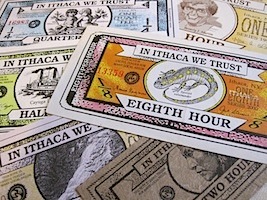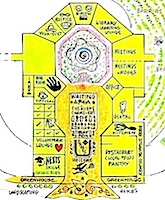




 |
 |
 |
 |
 |
| PAUL
GLOVER ESSAYS: community
control of food, fuel, housing, health care,
planning, education, finance. |
| HOME | INTRO | CURRENCY | SUCCESSES | HOW-TO BOOK | PUBLICITY | ESSAYS |
|
Fair Pay Forum:
Winner Take All? Maximum Wage? HOUR Per Hour? by Paul Glover February 1997 The HOUR system was created to emphasize that everyone's honest hour of labor deserves to be paid enough for dignified living. HOURS remind us that society is healthier when people are treated more fairly, with lesser extremes between highest and lowest pay. Referring to the fact that America's richest 5% of families earn 20% of total income, while the bottom 40% of families earn just 15% of total income, Labor Secretary Robert Reich said, upon leaving office last month, that the Clinton Administration's "unfinished agenda is to address widening inequality" (NYT 1/9/97). Throughout history, societies have realized that when there are a few rich and many poor, violent revolutions result. To prevent these, they have ritualized the fair distribution of wealth. The Kwakiutl Indians of the Pacific Northwest honored the rich only when they threw huge parties to give everything away. Plato declared in The Laws that society was strongest when the richest earned a maximum four times the lowest pay. Aristotle favored a five-times limit. The Bible says that since God owns all land (Leviticus 25:23), a Jubilee is required every 50 years, to return all land and forgive debts (Leviticus 25:10-34). The Bible forbade charging interest to the poor, or selling them food for profit (Leviticus 25:35-37). Similarly, in 1942 President Franklin Roosevelt proposed a Maximum Wage-- 100% tax on all income above ten times the minimum wage. Today the proposed Corporate Responsibility Act (HR 2534) would cut $800 billion in corporate welfare subsidies. Another law (HR 620) would prohibit corporations from deducting excessive CEO salaries from taxes. This question rises again because economic power is again so badly distributed (U.S. top 1% control 40% of national wealth) and pay scales are so extreme. While many richest Americans can be respected for their hard work and skill, CEOs of the nation's largest 500 companies now earn an average $4.09 million. This is 183 times more than the average U.S. worker (compared with 12 times more in 1950), or 400 times more than a minimum wage worker. These days the CEO's prime talent seems to be cutting jobs and wages, hiring temps and automating. While the top income tax rate in 1961 was 91%, today it is only 39.6% (the lowest tax on the wealthiest among industrialized nations). Were corporations taxed at 1950 rates, the federal government would gain $250 billion-more than the budget deficit. In 1951 lawyers earned 2.7 times the median wage; today they earn 7.5 times median. Last year, the ten richest health care executives held $2.4 billion in stocks, while hospitals laid off nurses. The nation's highest paid college professor (at Cornell Medical) gets $1,785,066. At the same time, 40 million hard-working Americans live below the official poverty line (family of four below $15,141), and another 40 million are below a more realistic definition of poverty. One in four American workers are employed in low-wage jobs (below $14,000), and seven million need more than one job. Two parents working full time for minimum wage earn only $20,600 pre-tax, making it tough to get further education or raise children well. Average real wages for private sector workers have declined 16% since 1973. And 2,000 good jobs are ended daily. Drug sales have thus become the last and best-paid ghetto enterprise, feeding on the desperation that jails can't control. America's situation becomes explosive. Would fair pay create a more balanced, dynamic society? Would there be more enterprise or less, were the top 10% of earners limited to "only" $200,000, or would enterprise become dominated by people motivated by national benefit rather than greed? Would capitalism grace-fully become more democratic, or would it decline? Would decentralized capitalism be less efficient, or more oriented to meet real needs? Would prices for luxury items go down to match available wages, or would money, better distributed, stimulate trading of basic goods among average people? Should everyone be paid the same, in the spirit of HOURS? Let's assume that workers would need to charge different amounts in order to pay for different overhead: equipment and tools, office rent, loan repayments, taxes and insurance. Then should workers charge the same for personal hourly effort? Should our common humanity be compensated equally in the marketplace? Or should there be pay differences for physical or mental exertion, level of knowledge and responsibility, job pleasure, productivity, creativity, number of children, supply and demand? If so who should be paid more? The plumber, the lawyer, the gardener, the babysitter? Whose work is really more valuable? And how much more valuable? These questions have been asked by many Ithacans especially since HOURS began to circulate. HOURS are usually paid at an HOUR per hour for informal labor, but are regarded more like ten dollar bills by many professionals (who charge multiple HOURS per hour), and by most businesses. Some local farmers and small businesses pay less than One HOUR per hour, because they earn so little themselves. We asked some HOUR earners what they thought of everyone being paid an HOUR per hour, or agreeing to a maximum wage. What kind of society would this be? Would it be better? Would it be possible? Greg is a cashier-- "Pay equity is definitely a desirable goal, because big differences in pay have led to luxury and starvation. The work we each do is supposed to make our lives better physically and emotionally and if I'm doing something eight hours a day that makes your life better, then it's only fair that I be compensated in a way that improves my life. The problem isn't that someone has a bigger car or fancier computer than me- the problem is people need jobs they can survive on and raise a family on. And the other part of the problem is people who do the hardest work get paid the least: farmworkers, cashiers and cleaners. It's perverse that specialized skills are more highly rewarded than the basic work that keeps life going." Jan owns a small business-"It's a good idea to have more pay equity, and not as much discrepancy, as between doctors and nurses who both do vital work. The "menial" services are the backbone of keeping things running. It's not fair, they're undervalued-the lowliest job doesn't have glamor. Surgeons had to go to school and have debt and insurance that they need to cover, but the nurses aides and orderlies do the jobs that are paid horribly, and they carry the bulk of responsibility. "There definitely needs to be a shakeup, but it's hard for me to see practically how to establish equal pay, since this country was built on the free enterprise concept that you can change in your fortune by choosing to put more or less into what you're doing. This is great if it doesn't exploit others. Tribal societies are more used to sharing, but that's not where we're at yet. More people nowadays share that social vision, but I'm hungry for hearing people speaking practically about how to get from here to there." Bill is a lawyer-"Frankly I'm as outraged as anybody at some of the wages being paid. I have a hard time believing anybody's work is worth so much, and I'd like to see a ten times cap. Assuming that prices would go down, I'd be doing better with just five times the minimum, plus expenses. "Stratification of wealth creates hard feelings, resentment, envy and bitterness. Despite hard work by most people, there are accidents of fate that make some people wealthier. So the current system is not fair. "But we're fighting a cultural norm that says you're worth what you're paid, and the more pay the happier you'll be. People are always comparing themselves with others this way. At the same time, job satisfaction is a very important factor. And the term 'professional' is slippery-it could apply to anyone. For example I need food but I don't grow food very well. "Enforcing equal pay nationally would be resisted, but if each company established a maximum wage, then equity could expand, as these companies proved themselves more competitive. And if medical students were paid for studying medicine, rather than going into debt, then the cost of medical care could come down." Joe owns a small business-- "Today the harder you work the less you're paid. Backbreaking work like ditch digging is often paid less than work in air-conditioned offices. But all jobs in society are necessary regardless how weirdly pay is being distributed. We need a whole new economy that's not based on production for profit but production for need. "I'm also very fond of the maximum wage being ten times the minimum. There's no need for an income gap wider than that. We can reward invent-tors and the hardest workers to that extent, but shouldn't reward greed." Maija is a massage therapist-- "It's reasonable that everyone should earn the same living. Everyone's labor is worth more than the minimum wage. But right now I wouldn't provide a massage for the same basic pay, because it takes more physical effort and mental focus, and I can't do massages eight hours per day. But if everyone were working four hours daily, I'd be able to make the average income. And if massage therapy were covered by government or insurance, it would be easier to direct my service toward the greatest need rather than the greatest ability to pay. |
"If
we were all paid One HOUR per hour, a lot of stuff would not get
done, but that could be good. People might come together as a group to
decide what was really important to do." Sara grows organic food-"We farmworkers are doctors by making good preventive food medicine. There's a misunderstanding of the kind of physical effort and knowledge it takes to make food, and the work and product are undervalued by comparison with office work. We should look more closely at all jobs and ask which are really more important. Lawyers or farmers, for example. Organic farmers do more than produce healthy food-we preserve scenic landscape, which has a greater social and environmental value. There's a certain level of pay which is enough for real comfort needs, beyond which we're disconnected from the environment." Mike is a carpenter-- "With equal pay, people would do what they naturally want to do. They'd be doctors because they like to heal, rather than just to get rich. Recently I was hired to rebuild a playground with this other guy. We got paid the same, so we trusted each other and took criticism from each other in a good spirit. If we'd been paid differently it would have created unnecessary social tensions. I've seen one person do ten times more work in an hour than the next person. You have to consider different human capacities, but there's a trade-off between maximizing production or maximizing social cohesion." Tommie is an electrician-- "I charge the cost of my expenses plus the hourly wage of the person I'm working for, including their benefits. I talk with people about what's fair pay. Equal pay is a desirable social goal. It would facilitate a more harmonious society. The least desirable work would get done with less resentment because these workers would no longer be at the bottom of the economic heap. We wouldn't have such poverty and the social problems poverty causes. When people don't have enough they feel despair that they'll never get anywhere, so they'll take chances to get wealth in ways that are harmful to society. The rich are paid obscenely, with no relation to overhead. My orthopedist gets paid up to $15,000 per day for two operations, and that has nothing to do with repaying education and insurance. A couple doctors at the hospital have told me their pay is ridiculously high, but that they'll accept it if that's what's offered. If pay were equitable you'd have more people going into medicine who were not simply monetarily motivated. I had a doctor friend who had a clinic who paid everybody in his office the same as he got, assistants and receptionists. Other doctors gave him grief about it." Melissa is studying midwifery-- "Ultimately in a fair society child care and car repair would be equally valued, monetarily and socially. If labor is wholehearted and good quality, then it should be equally valued. I'm a Star Trek fan and have often heard them say, 'We live in a culture now where we don't have hunger, poverty or disease, so now we can peacefully explore the Galaxy.' I think it's worth investing in that kind of dream." Ed is a home builder-- "I have a dentist friend who runs a mobile clinic, a converted bus, in the Adirondacks, on an annual $45,000 grant from New York state. He treats everyone at cost. He thinks all medicine should be socialized and everyone should have equal access to health care." Chickie manages a dentist's office-- "This country runs on greed. No matter how much some people make they're never satisfied. They constantly have to buy things-it's like a disease. They're lonely in a crowded room-money and clocks drive them. We should instead develop the satisfaction of helping others." Joe is a musician-- "The HOUR system has an egalitarian philosophical intent with a built-in attitude of non-gouging, but nothing is equal. Once you start measuring life according to dollars, you miss the point. I work hard to be the best I can be-I've practiced flute an estimated 20,000 hours-and although I'll never get fully repaid for that time, I wouldn't trade my years in music for any other work. On the other hand, there's a difference between getting paid extra for honest hard work, and using military and political muscle to get unfair advantage." Tricia is a nurse and massage therapist-- "An HOUR per hour would be fine as long as I can meet my needs and pay rent. Expenses would go down because prices would have to go down. It would probably eliminate poverty and eliminate greed as the major motivation for becoming a doctor. It would change our way of life, eliminating the class system." David is a woodworker-- "Equal pay sounds good to me. Too many people get hooked into competition. It would be better for everybody if people helped each other. I'd be willing to pay less to the dentist and more to the yard worker. There are CEOs getting $2,000 per hour and they're hostile to the environment. There are plenty of people who'd do the job for just $200 per hour who'd be more concerned about the environment." Judith is a teacher-- "I think equal pay is a good idea, but it would have to be adjusted to make sure that people are able to take care of their needs: young healthy singles with no dependents have lower overhead than couples 35 years old with kids. They have different expenses because the government doesn't pick up the social costs of food, health care, education, transportation, housing. If these were paid by government rather than by wages, then the costs would be spread across society, by taxing the rich. "Equal wages would force people to look at whether their work was really satisfying, rather than working just for high pay. And we'd need to calculate equal pay to include stock options." Bill is a craftsman-- "With equal pay people would be less greedy. It would make people more independent and resourceful. More equal, but people will always compare their work with others. I think we can get there but there'll be a lot of resistance. Already, most of the Middle Class are spending most of their time on food, shelter and fuel. When there's a ground floor on availability of basics, then we can talk about culture and arts, and open up to these and to a politics of participation. "If everyone were liberated from the frustrations of regular work, then we could focus on these problems. We wouldn't need to struggle so much, we could de-construct the social service system and re-create education. We'd have the psychic and financial room to talk about cooperation and race relations. We'd grow more local food, see less profit taking, more profit sharing." Tim is a typesetter-- "An HOUR per hour is desirable in the sense that being paid more is just a way to have more control of resources, and that means control of the direction of society. A society where we have an equal stake is one where we're more likely to cooperate, where decisions are made democratically, in the best interests of everybody. We need to challenge the assumption that the rich will use their greater resources for the general good. It's also likely we'd all be much richer because with the super-rich there's more wasted wealth. "We need a maximum wage. There are a few people owning too much wealth, with the rest of us out to wash. Lots of income is not through work but through investments. Investors risk only their surplus, not their own survival. There are many liberals who see benefit to the minimum wage, but no benefit to the maximum wage. "The whole situation, with some paid more than others for work is older than Jesus. I've been reading about how egalitarian societies became hierarchical. How some convinced others that only they have special magical abilities-to make rain fall, chase away enemies, connect to God, heal your leg. For me the issue is to provide these services in more democratic ways and to debunk professional status. "There's always going to need to be incentives to do less desirable jobs like cleaning toilets. Why aren't they getting a doctor's salary? Garbage collectors should get more than any professional. Because of HOURS, I've been able to ask $10.00 per hour for snow shoveling because that's the value of an HOUR. With that precedent, a collegetown landlord pays me $10.00. "More importantly, Americans need to redefine what work we do to be valuable persons, often regardless of money. That can be done, not just with cultural messages, but by depending on each other more and feeling more responsible to the neighbors and others with whom we have relations. Incentives would be in terms of importance and worth in the community and the respect of the people who we value. "Even equalizing U.S. wages would leave us a higher standard than the rest of the world, with us extracting their resources. So we'd need a slow global process of accepting HOURS as the world's money standard." For further reading: * The Maximum Wage, by Sam Pizzigati (Apex Press, 1992) * Too Much! "America's only newsletter dedicated to capping excessive income and wealth!" * The Wilding of America: How Greed and Violence are Eroding Our National Character, by Charles Derber Jubilee [email protected] |